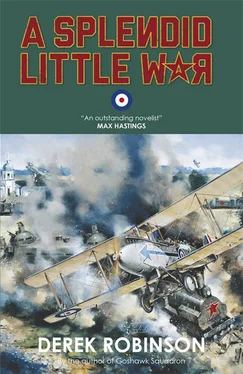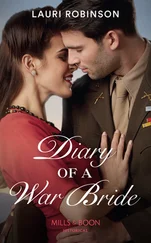“Do, do,” Wragge said. “Whatever it is.”
“Please bring everyone with me,” Borodin said to the adjutant. “The father, the daughter, the money, Aircraftman Simm.” He led them to the dockside. Wragge followed. “Throw that money in the sea,” Borodin told Simm.
Simm had a tight hold of the packet, and he hesitated.
“Do as you’re bloody well ordered,” Brazier said in his ear, “or I’ll throw you in with it, you tiny streak of shit.” The notes vanished over the edge.
“Now throw the rest in.” Borodin gave Simm the suitcase. “Just the money. Not the case.”
Simm got to work. Packets of hundred-rouble notes went flying into the Black Sea. Everyone watched. It was rare that Simm was the focus of anyone’s attention. He worked hard, and he was gasping for breath when he straightened up.
Borodin closed the suitcase and gave it to the father. “They were worthless,” he told Simm. “Denikin roubles. He’s been printing money at top speed but his roubles collapsed even faster. Now they’re worth nothing. Waste paper.” He looked at Wragge. “You can let the Russians go.”
“Go,” Wragge said. They left. The girl was in tears, and so was the father.
“Let me speak to the squadron,” the adjutant said. Wragge nodded. They walked back. Brazier assembled everyone in a half-circle.
“This man…” Brazier held Simm by the ear. “He disobeyed an order while on Active Service. Told to remain here, he absented himself without permission. That is conduct prejudicial to good order and discipline. The maximum punishment is two years’ imprisonment.”
Simm wriggled. His ear hurt. Brazier tightened his grip. Now the ear hurt even more. Simm stopped wriggling and shut his eyes to the pain, but his ear was still on fire.
“Furthermore,” the adjutant said, “this man was apprehended in the act of taking a large bribe in exchange for going through a form of marriage to a young Russian woman with the purpose of getting her out of the country.”
That information impressed the squadron, but not by its criminal nature. Fancy old Simmy, trying to pull off a trick like that. Old Simmy, ugly as sin, thick as two short planks, gets a headache just tying his shoelaces. Old Simmy wanders off to have a slash and someone tries to give him a place to dip his wick twice nightly plus a load of loot! God looks after fools and idiots, that’s all you can say.
“The marriage would not have been legal,” Brazier said. “An act of fraud. The maximum punishment for fraud is penal servitude. The money was in worthless roubles. They have now been dumped in the sea. The girl was almost certainly riddled with disease. If he married her, this man would have been infected with incurable types of pox that would rapidly deprive him of what little manhood he has.”
He let that sink in. Old Simmy didn’t look so clever now.
“Think of this. Our sole task is to get this squadron off these docks and onto a British warship. Ignore the civilians. They are not your concern. Irrelevant. Only the squadron matters. Nothing else. Dismissed.”
“Well said, Uncle,” Wragge murmured. He took Oliphant’s arm and said, “Come with me, Tusker. I have a great wish to rise to great heights and get above this squalor.”
They climbed the ladder on a boxcar and sat on the roof.
“Did you ever see such a miserable crew?” Wragge said. “Dregs of a nation. Not their fault, I suppose. No food, no shelter, winter coming on, and they’re trapped in this godawful dead-end.” From time to time the warships boomed out another heavy echoing salvo but nobody paid them any attention. “Is it my imagination,” Wragge said, “or is there a strange smell in the air?”
Oliphant sniffed. “Five thousand armpits.”
“More like ten thousand. Could be twenty.”
“You can’t count the blighters. They keep moving.”
“Going everywhere and nowhere. I’m as humane as the next man, Tusker, but I can’t feel sorry for them. I can feel a sort of pity for one man, or his family, maybe his village. But this lot are just an enormous nuisance.”
“It’s not why we came to Russia, is it?” Oliphant asked.
“They cheered us when we arrived. Seems a long time ago.”
“They liked to cheer. Cheer and say Na Moskvu . Usually when they were sozzled.”
“I say. Look over there.” They stood up. “Isn’t that the Russian father and his daughter? The one he tried to sell? See? On the dockside. Right on the edge.”
Oliphant saw them. “He’s holding her hand. That’s a damn dangerous place to stand. Oh, my Christ.” The father and daughter had jumped. Vanished from sight.
Wragge turned away. “Sweet sodding buggeration in spades,” he said.
“The water must be freezing cold. I don’t suppose they can swim. Most Russians can’t, according to Borodin.”
Wragge walked to the end of the boxcar, stared at the sky, and walked back. “Well, she wanted to escape,” he said. “That was some kind of escape.”
After that there was nothing to say. Time passed. They grew bored, and stiff and cold; then a Royal Marine arrived and they climbed down from the roof. “Colonel’s compliments, sir,” the Marine said. “Please unload all aircraft without delay.” He saluted and left. Oliphant went to tell the ground crews.
“They jumped,” Wragge said to Borodin. “The father and his daughter jumped in the sea.”
“Yes. A lot of people are doing that.”
Amazingly, a small British tank appeared, and it rumbled up and down, emptying a space alongside the train.
“If he could give us a good fifty yards of clearance,” Wragge said, “I bet we could take off. Maximum revs. No problem.”
“What then?” Borodin asked.
“Dunno. The Navy has aircraft carriers. There might be one out there. Or we could fly to Turkey.”
The ground crews set about offloading the Nines and the Camels. They were quick; it was an old routine for them. They had assembled the final aircraft when the colonel and his escort arrived. “Fine machines. You must be proud,” he said to Wragge. “You do realize that we have no choice. Nothing must be left for the enemy. Not a thing.”
The tank’s engine roared and pumped smoke from its exhausts. Its tracks climbed over the tail unit of a Camel and crunched along the fuselage until the undercarriage collapsed and the tank crushed the cockpit, the twin Vickers guns, the radial engine, the propeller.
The C.O. watched his ground crews and saw them standing quite still, all the fitters and the riggers and the armourers. Some had looked away. One or two seemed to be in tears. As the tank moved forward, a young mechanic made a move towards it as if he could save the next Camel. The adjutant and a flight sergeant grabbed him. “Discipline, lad, discipline,” Brazier said, and the airman went back to his place. The tank climbed on top of the aeroplane and collapsed it. Tank-tracks made sparks on paving stones as the Camel got chewed up and shattered. Then the next Camel, and finally the Nines.
The C.O. sought out Patterson, the chief mechanic. “I’m terribly sorry about this,” he said. “Your chaps must feel very let-down.”
“They put heart and soul into their work, sir. Toiled night and day. Owned those aeroplanes. You borrowed them, sir, but they belonged to us. Mind your back, sir.”
They moved away from the tank. It swung around until it was facing the Black Sea. It roared and rolled forward. The driver came out of the turret hatch in a hurry and jumped clear. The tank picked up speed and went over the edge and made a splash that reached up and soaked the dockside. The ground crews gave an ironic cheer.
“Get your men lined up,” the colonel told Wragge. “They must follow me to the embarkation point. Only your squadron. No refugees. Use your bayonets, if you have to. No civilians! The women are the worst. They’ll bribe you with the family jewels, if you let them.”
Читать дальше











